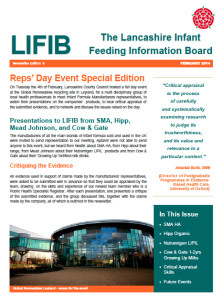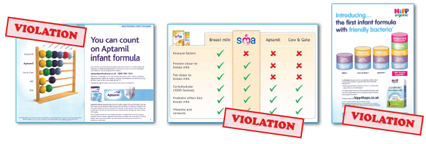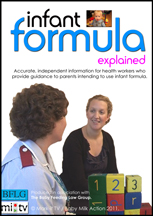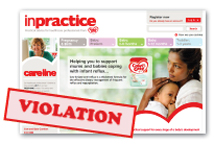The following information is available on an A3 full-colour poster in our Virtual Shop.
Baby Milk Action members and subscribers can download a pdf version of the poster for their own use at the bottom of the page.
Health workers, conflicts of interest and the baby feeding industry
World Health Assembly Resolution 58.32:
‘ensure that financial support and other incentives for programmes and health professionals working in infant and young-child health do not create conflicts of interest.’
BABY FEEDING COMPANIES IDEALISE THEIR PRODUCTS
The International Code of Marketing of Breastmilk Substitutes and subsequent, relevant Resolutions of the World Health Assembly prohibit manufacturers, distributors and retailers from promoting breastmilk substitutes. Health workers are given responsibility for advising pregnant women and parents. The aim is to protect breastfeeding and ensure the proper use of breastmilk substitutes, when these are necessary, on the basis of adequate information and through appropriate marketing and distribution.
Companies should abide by these standards independently of government measures. In practice they do not, unless forced by legislation – or shamed by consumer campaigns.
The Code permits manufacturers and distributors of breastmilk substitutes to provide ‘scientific and factual’ information on their products to health workers, but analysis shows what they provide is promotional and rarely supported by independent evidence.
The Advertising Standards Authority (ASA) in the UK refuses to investigate complaints about advertisements directed at health workers. However, it has upheld complaints brought by Baby Milk Action and others about advertising directed to the public for the leading brands of formulas.
For example, advertising has claimed both Aptamil and SMA are the ‘best’ formulas, but these claims could not be substantiated. Products have to comply with composition requirements set out in legislation. There is no proven benefit from the optional ingredients that are often the focus of advertising campaigns.
 Example on the poster: What’s the best milk after Lisa’s? Not SMA formula according to the ASA ruling upholding Baby Milk Action’s complaint. As the graphs shown on the poster from advertising to health workers demonstrate, all companies claim their brand is closer to breastmilk than competing brands.
Example on the poster: What’s the best milk after Lisa’s? Not SMA formula according to the ASA ruling upholding Baby Milk Action’s complaint. As the graphs shown on the poster from advertising to health workers demonstrate, all companies claim their brand is closer to breastmilk than competing brands.
AVOIDING CONFLICTS OF INTEREST
Health workers have responsibility under the Code and Resolutions to provide accurate information and to avoid conflicts of interest.
Organisations such as the International Society for Social Pediatrics and Child Health have policies rejecting baby feeding company sponsorship. Some professional bodies in the UK and other countries already refuse sponsorship and advertising from these companies, and do not allow their stalls at events – the information provided is generally misleading.
The Conflicts of Interest Coalition/Network is an international campaign by hundreds of groups and networks calling for policy making to be free from commercial influence. Promotion costs money.
Formula could be cheaper for those parents and carers that use it if companies abided by the rules and stopped promotional campaigns.
NO PROMOTION – CHEAPER FORMULA
COMPANY INFORMATION REQUIRES EXPERT ASSESSMENT
UNICEF UK Baby Friendly Initiative states with regard to the health service:
‘All advertising of products covered by the Code should be prohibited within the policies of the institution and company representatives should have only very restricted access to the service or staff. It is suggested that they see the member of staff considered most expert in infant feeding and that she/he then distribute any relevant scientific and factual information to the rest of the staff in an appropriate manner.’
A guide for health workers to working within the International Code of Marketing of Breastmilk Substitutes.
The approach taken by the Lancashire Infant Feeding Information Board (LIFIB) is to invite company representatives to present information on their products to a multi-disciplinary team. The team critically appraises this information – and finds much of it is not robust. Any relevant information on products and other infant feeding issues is communicated in its bulletin – company materials are not distributed.

To receive the bulletin contact: LIFIB(at)outlook.com
INDEPENDENT INFORMATION IS AVAILABLE
The report Infant Milks in the UK from First Steps Nutrition Trust contains the latest information on milks available for infants and children, with clear independent guidance on their suitability.
This report is widely used by health professionals across the UK and is supported by UNICEF, The Baby Feeding Law Group, The Royal College of Midwives, The Welsh Assembly Government, The Royal College of Paediatrics and Child Health and others. There are companion reports, such as Fortified milks for children: A worldwide review of fortified milks marketed for children over 1 year.
Baby Milk Action produced the DVD Infant Formula Explained on behalf of the Baby Feeding Law Group. Short films for health workers and for parents and carers intending to use formula explain the different types of formula on the market and how to reconstitute powdered formula correctly.
COMPANY SPONSORSHIP AND STUDY DAYS ARE MARKETING STRATEGIES
Baby feeding companies offer health workers gifts, sponsorship for events and study days organised by the companies themselves. Study days will sometimes have guest speakers on topics of interest, but are usually branded with the formula name and require health workers to provide their personal and workplace contact details to register. Sometimes products are promoted directly.
Professional services are offered via websites, also used to gather contact details and promote products, such as Danone’s In Practice website, shown below.
A job description for a Nestlé post in Canada (July 2014) sets out the major responsibilities of the staff employed to target health workers:
- Stimulate retail sales through the promotion of infant formulas and cereals to gain Healthcare Professionals recommendations (physicians, nurses, etc.) based in community clinics and offices.
- Manage and develop hospital accounts to targeted growth plan.
- Prospect and build relationships with target Healthcare Professionals and Key Opinion Leaders.
- Plan, lead and /or participate in medical education events/conferences.
These events violate WHA Resolution 58.32. The Baby Friendly guide in the UK states:
‘UNICEF UK requires that education provided by the companies not be held on Baby Friendly accredited facilities premises. We also recommend that staff are not allowed to attend such events on work’s time.’
Staff can refuse to speak at or attend such events, wherever they are held.
Increasingly baby feeding companies are attempting to target pregnant women and new mothers directly under the guise of providing nutrition education, even breastfeeding support. Article 5.5 specifically prohibits companies from seeking direct and indirect contact with these groups.
TIGERS – DRAMA EXPOSES HOW COMPANIES TARGET HEALTH WORKERS
This 90-minute feature film by Oscar-winning Director Danis Tanovic is based on the true story of a former Nestlé Medical Delegate in Pakistan who exposed company marketing practices with the help of IBFAN.
For details and screening dates see: www.babymilkaction.org/tigers
Order the above information on a poster in our Virtual Shop.
Baby Milk Action members and subscribers can download a pdf file of the poster for their own use by clicking on the link below.
You need to be a member/subscriber to see the rest of this article. Click here to join.





